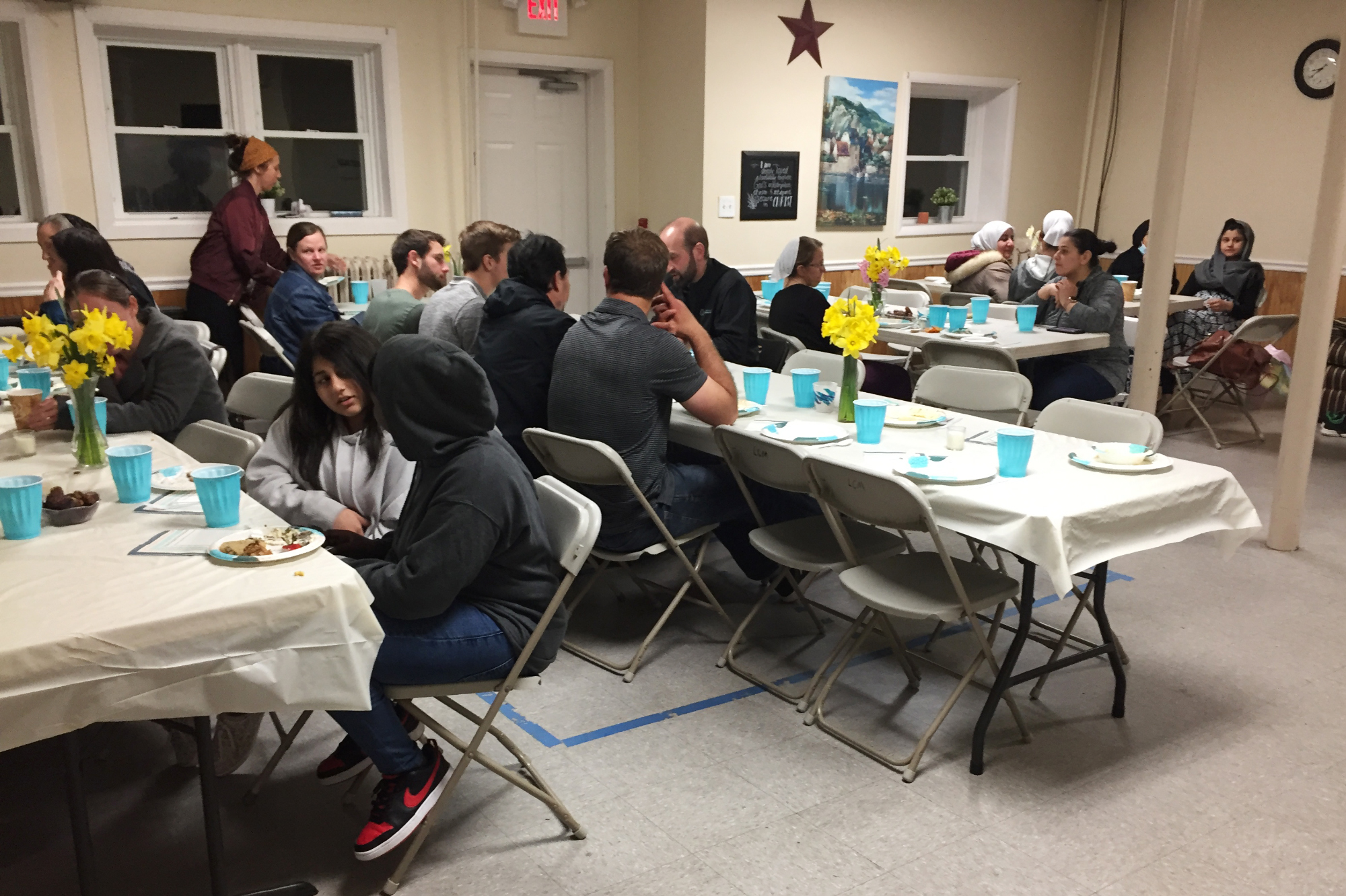“I like living here,” Nur told me. “The people are so friendly!”
Nur (all students’ names are changed in this blogpost), was a middle-aged Afghan woman, with two of her sons, black-haired little boys, sitting next to her at the table. Several of her oldest children, Nur told us, were still back in Afghanistan, and Nur asked us to pray for them.
Lancaster County has been called the “Refugee Capital of America” (see news articles here and here), and one of the many services available are free ESL classes at the Alpha & Omega Community Center.
My friends Rhonda and Kendra told me about the English classes needing teachers and arranged for me to visit last year. In January, I started teaching regularly. There are three levels of classes for adult learners: beginner, immediate, and advanced, or Levels 1, 2, and 3. Students attend the classes two evenings each week, with two sets of teachers, one taking Monday classes, the other Thursday classes.
My brother, Andrew, and I teach Level 3. We use an adult ESL curriculum— by mutual agreement, Andrew teaches the first part on vocabulary and grammar, and I take the second half about culture, which I try to spice up with word and story games.
Dariush was one of our first students, and very studious. “I knew English well when I was eleven,” he explained. He is now about thirty, and he and his wife Maryam had both been doctors in Afghanistan.
Before classes began, Andrew and I agreed we won’t ask any student questions about their background— including their home countries. But after a few classes, we learned all of students were Afghans (the word “Afghani” actually refers to the currency), and that most of our half-dozen or so students were related. Faren was Maryam’s sister (and a third sister was in the Level 2 class). Maryam’s brother, and her nephew were close to the same age and stayed in the same apartment. Ahmad, the nephew, came to our class for the first time three days after having arrived in Lancaster from a military base in New Jersey.
“I come from a family of twelve children,” explained Maryam. She and Dariush have three children. Maryam would like to get her medical license here in US. But the licensing exams are as long as eight hours, and it has been several years since Maryam graduated from the University of Kabul. “And our minds— they forget,” Maryam says.
Another student, Medina, isn’t related to Maryam, even though the two young women are obviously close. Medina is nineteen, and expecting her first child. Her husband works nights at Tyson Foods (a chicken-processing plant) and neither has family here in the US. “I get scared staying alone in the house,” Medina told me.
Some of the students have a slightly sardonic attitude about their circumstances. When “homeless” was a vocab word, Dariush grumbled, “Homeless. That’s me. I don’t own a home.” I explained that “homeless” usually refers people living on the streets, not in rental properties, but of course, “homeless” is probably exactly how refugees feel.
Afghans typically speak Dari or Pashto, which is written right to left, using the Arabic script. Our students do well at reading English despite the the difference in alphabets. (Sometimes Level 1 students aren’t even literate in their native tongues.)
The classes are informal (they’re not paying for them and we aren’t professionals) and we never know exactly how many students will come. I try to come to class prepared with different activities— for example, one YouTuber suggested using Google Maps and having the student tell you about a favorite vacation spot. (Faren told me about an island in Turkey with a tower where an overprotective king locked up his daughter. It’s called the Maiden’s Tower.)
During the month of April, all the students were fasting for Ramadan during daylight hours, and class time was exactly the time they planned to eat their evening meal. So we decided it would be best to break for the month and pick up again in May.
While the classes were on break, Rhonda planned an evening for all the students and teachers to get together for a late supper, games, and conversation. Unfortunately, Maryam’s family couldn’t make it, but Medina could. I met Kim, a Church World Services volunteer and nurse who lived in Afghanistan for twenty years and speaks Dari. We enjoyed a meal of Afghan and American dishes, talked about food, flowers, and families, and Nur told me how happy she was to be in Lancaster, the refugee capital of America.



This sounds like a great opportunity for those trying to settle in a new life. I can’t imagine the losses that some must have had .
Starting over in a new country must be very difficult, and learning another language as an adult is a huge undertaking.
Susan, we are undertaking a similar ESL class online. All students are adult Afghan women refugees. Is there a way to contact you directly to ask a few questions that might help us as we design our program. I would really appreciate it.
Thank you,
Liz
Sure, I will be in touch!
What ESL curriculum do you use?
We use Intercambio. It includes an app, student workbooks, and teacher’s manuals.